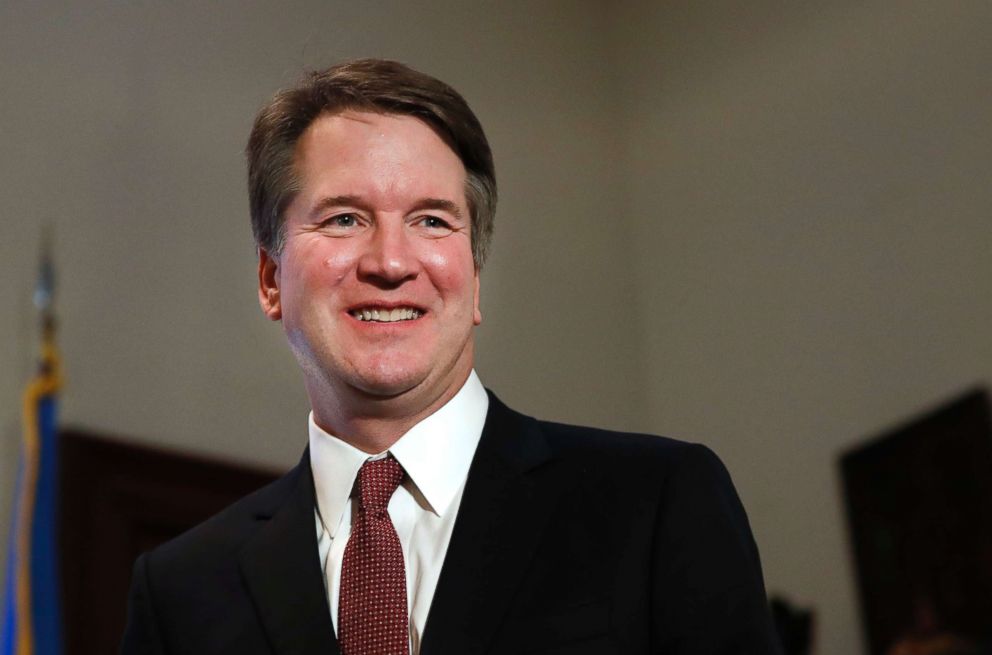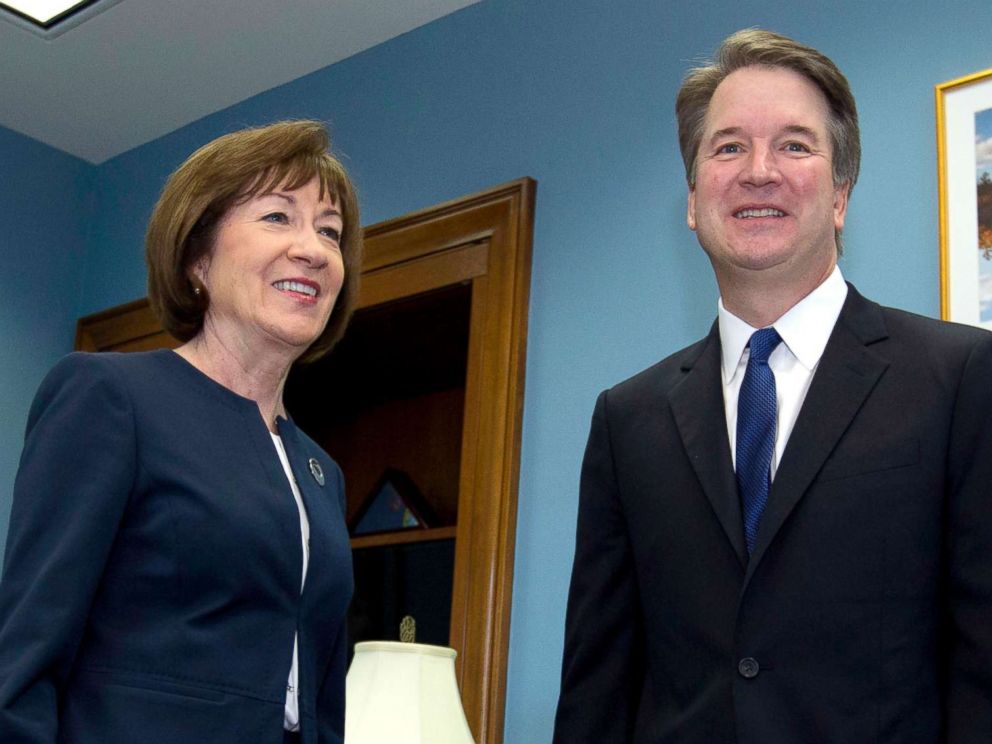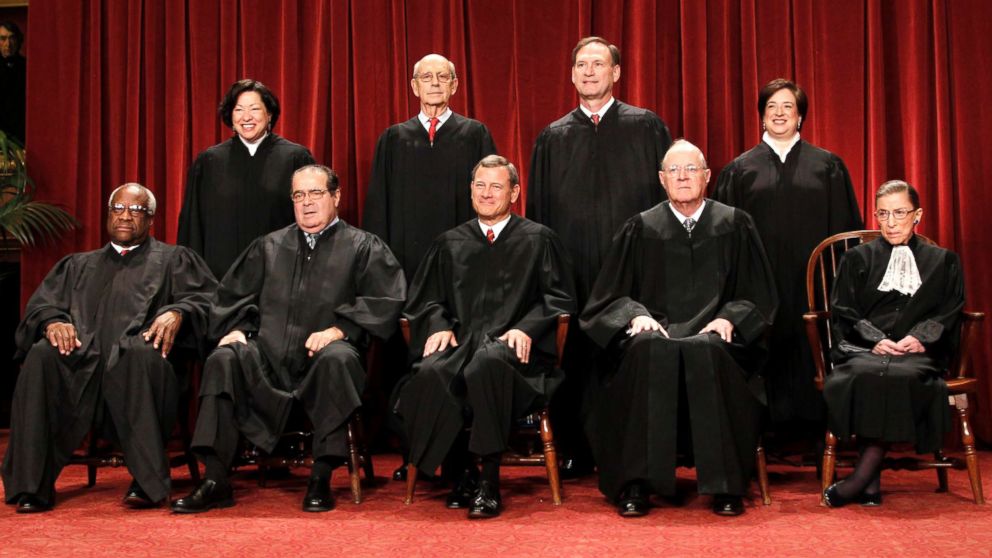Stakes are high for Kavanaugh, Supreme Court, as confirmation hearings begin
Confirmation hearings for Supreme Court nominee Brett Kavanaugh begin Tuesday.
WASHINGTON, D.C. -- The stakes could hardly be higher as confirmation hearings for Brett Kavanaugh kick off Tuesday before the Senate Judiciary Committee.
Because he would replace Justice Anthony Kennedy - a crucial swing vote - his presence could tip the balance - and fundamentally change the Supreme Court for a generation.
When the 53-year-old conservative federal appeals court judge is sworn in and makes an opening statement, it will be the culmination of many hours of preparation, including mock question and answer sessions - complete with fake protestors. He's had 65 one-on-one meetings with senators as well, all designed to make the marathon four-day affair go smoothly and to clear his path to the high court.
But Democrats are promising anything but smooth sailing.
"Sparks will fly at this hearing," Sen. Richard Blumenthal, a Connecticut Democrat, promised Friday in a conference call with reporters.
Democrats plan to grill Kavanaugh on a host of hot-button issues, according to three senators' aides. They range from social policies, including LGBTQ rights and the fate of Obamacare, to national security matters. They plan to paint him as a partisan Republican from his days before being nominated to the bench.
But perhaps most important, Democrats will try to pin him down on whether he might vote to overturn the landmark 1973 Roe v. Wade court decision establishing a constitutional right to abortion and legalizing it nationwide.
At the same time, Democrats will demand he explain his expansive views on executive authority and especially his view that sitting presidents should be immune from investigation and prosecution — until they leave office — salient now as President Trump faces possible legal fights of his own with special counsel Robert Mueller.
If Mueller were to subpoena Trump to testify in the Russia investigation, the showdown could likely be decided by the Supreme Court — including a Justice Kavanaugh. Because that and other legal questions involving investigations into the president and his innermost circle could reach the court, Democrats are expected to demand Kavanaugh recuse himself now. Burt sources tell ABC News he is not expected to commit to recusal

Republicans say they are not concerned.
"I'm sure Judge Kavanaugh will follow, you know, the guidelines and recuse himself in cases where he should, but by and large I think that judges, justices should be involved in cases," Sen. Ron Johnson, R-Wisc., told Martha Raddatz on ABC’s "This Week With George Stephanopoulos."
Democrats had tried, in vain, to delay the hearings, decrying what they said was the lack of documents produced from Kavanaugh’s time as staff secretary to President George W. Bush. It's a gatekeeper position at the heart of the presidency, during a time when consequential matters of national security - such as treatment and interrogations of battlefield detainees and controversial warrantless wiretapping programs - were approved.
Heading into the Labor Day holiday weekend, the Trump White House asserted executive privilege in withholding over more than 100,000 pages of documents from Kavanaugh’s time both as staff secretary and associate counsel in the Bush White House.
Republicans counter by saying they’ve made available a larger record for Kavanaugh than any previous nominee, pointing to more than 440,000 pages of material and the judge’s 308 decisions.
Democrats immediately pounced, with Senate Minority Leader Chuck Schumer saying the withholding of documents "had all the makings of a cover up."
"Senators should not be willing to cast a 'yes' vote for a nomination of this magnitude when more than 90 percent of the nominee’s record is being denied to them," tweeted the Judiciary Committee’s top Democrat, Sen. Dianne Feinstein of California.
Nevertheless, the Democratic attack — and the Republican defense — of Kavanaugh’s record is expected to be sharp and extensive, with questioning expected to start on Wednesday - running late into the evening — and into Thursday.
Judiciary Committee Chairman Chuck Grassley, in leading off the questioning, is expected to try to steal Democratic thunder — a strategy he has employed for years — by giving Kavanaugh a friendly chance to address their top topics, such as executive authority, right out of the gate, a move that allows a nominee to diffuse controversy early on.
"Let’s just say, the chairman is well-aware of their issues," a senior Grassley aide told ABC News when asked if the Iowa Republican would employ the same strategy again.
Avoiding controversy over abortion is not likely.
Sen. Feinstein recently tweeted her disdain for the nominee's legal views, writing, "Brett Kavanaugh praised the dissent in Roe v. Wade. He called Justice Rehnquist, who authored the dissent in Roe, his 'judicial hero.' There's no mystery as to where he stands on Roe v. Wade."
But a comment Sen. Lindsey Graham, a South Carolina Republican and a senior committee member, made this weekend could raise the eyebrows of two female Republican senators whose votes could be crucial for Kavanaugh’s confirmation.
"This idea that Roe v. Wade is going to be challenged at the state level, there are all kind of laws out there, some may work their way up to the Supreme Court," Graham said on NBC's "Meet The Press." "He will give great deference I'm sure to Roe v. Wade, but it can be overturned like every other decision. But that will be up to the facts and the record," Graham said.
Supreme Court nominees in the modern era have studiously avoided committing to positions on matters they believe might come before them should they be confirmed, and normally say merely that an issue is "settled law" or "established precedent."
GOP Sens. Lisa Murkowski and Susan Collins, who both support abortion rights, have said they will be watching closely to help them decide how to vote. And with the Republicans' razor-thin majority, every vote counts, unless some Democrats in red states go along.

Democrats will question Kavanaugh, too, about his time working as a dogged attorney for Independent Counsel Ken Starr’s wide-ranging probe of President Bill Clinton. Kavanaugh advocated asking Clinton about graphic details of his sexual relationship with intern Monica Lewinsky. That has roiled Democrats who see that as a move from a nominee well-steeped in rough-and-tumble politics.
They want to ask him why, in a 2009 law review article, did he dramatically reverse himself - writing, "Criminal investigations take the president's focus away from his or her responsibilities to the people."
Schumer has said Trump "chose the candidate he thought would best protect him from the Mueller investigation."
The recent plea agreement by the president’s former personal attorney, Michael Cohen, who appeared to implicate his boss in campaign finance violations during a court hearing -- has some other committee Democrats calling Trump an "unindicted co-conspirator" who, given that, shouldn't be allowed to nominate anyone to the high court, demanding the hearings be stopped.
Trump was not named in that court proceeding.
To home in on that message, Democrats have invited as their star outside witness, former Nixon White House Counsel John Dean, who testified against his boss in the Watergate cover-up of presidential misdeeds.
A number of the 28 outside witnesses - expected to testify briefly on day four - appear designed to create more sparks.
Republicans have called a self-styled "liberal Democrat and feminist" attorney, Lisa Blatt, who wrote of Kavanaugh in a Politico op-ed: "Sometimes a superstar is just as superstar," adding, "The Senate should confirm him."
"It’s easy to forget that the 41 Republican senators who voted to confirm [Ruth Bader] Ginsburg knew she was a solid vote in favor of Roe, but nonetheless voted for her because of her overwhelming qualifications," Blatt wrote. "Democrats should quit attacking Kavanaugh—full stop. It is unbecoming to block him simply because they want to, and they risk alienating intelligent people who see the obvious: He is the most qualified conservative for the job."

Democrats have invited a Parkland shooting survivor to highlight what they say are Kavanaugh’s pro-gun rulings and a young boy, who suffers from a degenerative disease, to lobby members to save his Affordable Care Act health coverage, Democrats say, by opposing Kavanaugh. Something that could be in jeopardy if a case - like one in the arguments phase just this week in Texas challenging the Affordable Care Act’s pre-existing conditions mandate - makes it to the high court.
Republicans, looking to humanize Kavanaugh, have invited his former college roommate and a parent of a teenager the judge coaches in women’s high school basketball.
Often, little is learned in the hearings, and even less is changed about already-entrenched positions where a handful of Democrats on the Judiciary panel -- all potential Democratic opponents of President Trump in the 2020 presidential campaign -- have already announced their opposition to Judge Kavanaugh.
Republicans hope to have Kavanaugh confirmed by the start of the new Supreme Court term October 1, and absent any major pitfalls during the confirmation process, the political odds are that he is on track to make it there.




